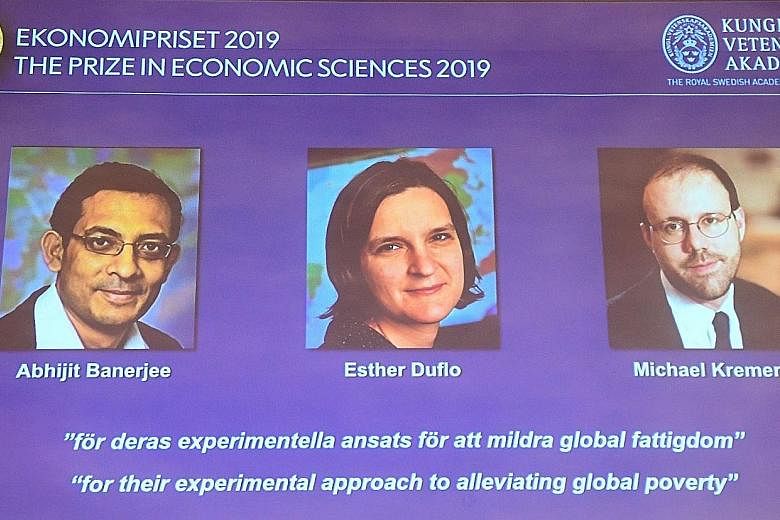STOCKHOLM • Three economists from the Massachusetts Institute of Technology (MIT) and Harvard University have been awarded this year's Nobel prize for their research into how to move people out of poverty.
MIT professors Abhijit Banerjee, a 58-year-old who was born in India, and his wife Esther Duflo, 46, who was born in France, share the prize with Harvard's Professor Michael Kremer "for their experimental approach to alleviating global poverty".
"The research conducted by this year's laureates has considerably improved our ability to fight global poverty," the Royal Swedish Academy of Sciences said yesterday.
"In just two decades, their new experiment-based approach has transformed development economics, which is now a flourishing field of research."
The academy's decision to honour work dedicated to fighting poverty, which it said is among today's most "urgent issues", comes as income inequality grows into one of the most widely debated topics in the field of economics.
Prof Duflo is the second woman and the youngest person ever to win the economics prize, which has existed for 50 years. In 2010, she won the John Bates Clark medal, after being identified as the economist under the age of 40 who contributed most to the profession.
"Our goal is to make sure the fight against poverty is based on scientific evidence," she said in a webcast phone call with journalists. "It starts from the idea that often the poor are reduced to caricatures, and often even people who try to help them don't actually understand the deep roots of the problems they are addressing."
The academy said the trio helped shape a new approach to fighting poverty by splitting the issue into smaller and more manageable questions, and studying productivity levels within developing countries. Field research includes how to improve school results in Kenya, studies on micro financing and a deworming research project on how much healthcare should cost.
The results of their studies and field experiments included helping millions of Indian schoolchildren with remedial tutoring, and encouraging governments around the world to increase funding for preventative medicine.
Prof Kremer, 54, has helped develop a programme to stimulate private investment in and distribution of vaccines in the developing world.
Prof Duflo said receiving the prize was "humbling," in part because of her age. The award is a reflection of "incredible collective work" and the three winners represent "hundreds of researchers who are part of a network that work on global poverty," she said.
BLOOMBERG, REUTERS

